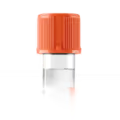Method: FDA-cleared clinical laboratory assay performed in CLIA-certified, CAP-accredited laboratories. Used to aid clinician-directed evaluation and monitoring. Not a stand-alone diagnosis.

A derived biomarker is a value that is calculated from other directly measured biomarkers rather than being measured directly in the lab.
Key Benefits
- Identify autoimmune thyroid disease, especially Hashimoto’s, by detecting TPO antibodies.
- Spot early thyroid risk; TPO positivity predicts future hypothyroidism, even if TSH normal.
- Explain symptoms like fatigue, weight gain, or cold intolerance as autoimmune thyroiditis.
- Guide subclinical hypothyroidism decisions; positive TPO supports earlier thyroid hormone treatment consideration.
- Protect fertility and pregnancy; positivity signals miscarriage and preterm risks, prompting closer TSH monitoring.
- Flag postpartum thyroiditis risk to plan timely postpartum thyroid testing and follow-up.
- Set a monitoring plan; TPO positivity warrants more frequent TSH checks over time.
- Best interpreted with TSH, free T4, and your symptoms.
What is Thyroid peroxidase antibody?
Thyroid peroxidase antibody is an immune protein that targets thyroid peroxidase (TPO), an enzyme on the surface of thyroid follicle cells that helps build thyroid hormones. It is produced by the body’s B cells when immune tolerance to TPO is lost, so it specifically binds the TPO enzyme in the thyroid. TPO normally oxidizes iodide and attaches iodine to thyroglobulin (iodination and coupling) to form thyroxine and triiodothyronine (T4 and T3), the hormones that set the body’s metabolic pace.
Because it targets a key step in hormone synthesis, the antibody doesn’t serve a normal physiological function; it is a sign of an autoimmune response against the thyroid (autoimmune thyroiditis). Its presence reflects immune recognition of a thyroid self-protein and ongoing or past thyroid-directed inflammation. Clinically, it is used as a marker of thyroid autoimmunity, indicating that the hormone-making machinery is under immune surveillance and may be vulnerable to disruption.
Why is Thyroid peroxidase antibody important?
Thyroid peroxidase antibody (TPOAb) reveals whether the immune system is targeting thyroid peroxidase - the enzyme that helps make thyroid hormone. Because thyroid hormone coordinates energy use across the brain, heart, muscles, skin, gut, and reproductive system, antibodies against this enzyme can foreshadow wide‑ranging effects long before hormone levels change.
Most labs call results normal when they’re below the assay’s cutoff; the healthiest pattern is undetectable or very low. Titers can appear years before shifts in TSH or free T4, and their height reflects immune activity more than day‑to‑day thyroid output.
When TPOAb is low or negative, immune tolerance is intact and the thyroid is unlikely to be under autoimmune attack. Metabolism, mood, heart rate, and menstrual cycles are typically unaffected by autoimmunity. If thyroid‑type symptoms are present despite a negative result, causes other than autoimmune thyroiditis are more likely. In pregnancy, a negative TPOAb is reassuring and linked to lower risk of miscarriage and postpartum thyroiditis.
When TPOAb is elevated, it most often signals Hashimoto’s thyroiditis. The gland may still make normal hormone early on, but the lifetime risk of hypothyroidism rises, with fatigue, cold intolerance, weight gain, constipation, dry skin, heavy periods, and goiter as immunity damages follicles. LDL cholesterol can climb, heart rate may slow, and cognition and mood can dull. Women are affected more than men; in pregnancy, positivity raises risks of miscarriage, preterm birth, and postpartum thyroiditis. In children and teens, positivity predicts autoimmune thyroid disease and, if hypothyroidism develops, can impair growth and school performance.
Big picture: TPOAb links the immune system to metabolic control. Interpreted with TSH and free T4, it helps predict thyroid trajectory, cardiovascular and neurocognitive impacts, and reproductive outcomes over time.
What Insights Will I Get?
What Thyroid peroxidase antibody tells you.
Thyroid peroxidase antibody (TPOAb) measures immune reactivity against thyroid peroxidase, the enzyme that enables thyroid hormone synthesis. Because thyroid hormones drive cellular energy, metabolism, cardiovascular function, cognition, mood, and reproductive health, TPOAb is a window into autoimmune pressure on the thyroid system before, during, or after changes in TSH and free T4 occur.
Low values usually reflect little to no autoimmune targeting of the thyroid. Enzyme activity is preserved, thyroid hormone production is steady, and downstream systems - energy, temperature regulation, lipids, and menstrual or sexual function - tend to be stable. In pregnancy, low values are typical and align with a lower likelihood of postpartum thyroiditis.
Being in range suggests immune tolerance to thyroid tissue and lower short‑term risk for thyroid failure. It generally indicates stable hormone synthesis with less fluctuation in TSH. Most experts consider values toward the negative/undetectable end of the laboratory range as optimal.
High values usually reflect autoimmune thyroiditis (Hashimoto’s) and can also appear in Graves disease or postpartum thyroiditis. Antibodies may precede abnormal TSH, so thyroid function can be normal at first, yet the risk of progressing to too little thyroid hormone (hypothyroidism) increases with higher titers. System effects include fatigue, cold intolerance, weight gain, lipid changes, mood and cognitive slowing, and menstrual or fertility disturbances; brief early hyperthyroid phases can occur in thyroiditis. Positivity is more common in women, increases with age, and in pregnancy is linked to higher risk of miscarriage and postpartum thyroiditis.
Notes: Interpretation depends on the assay and lab cutoffs; antibodies can persist even when thyroid levels normalize. Titers often fall during pregnancy and rebound after delivery. Iodine exposure, other autoimmune diseases, and drugs such as amiodarone, interferons, and immune checkpoint inhibitors influence results. Biotin and some immunoassays can artifactually affect thyroid tests.

.svg)









.avif)
.avif)


